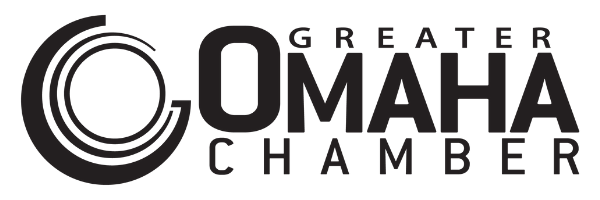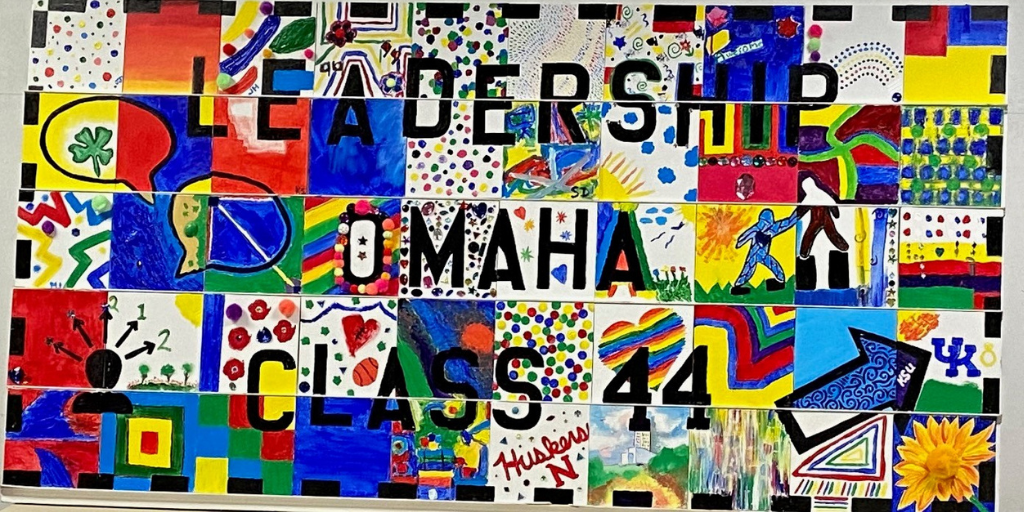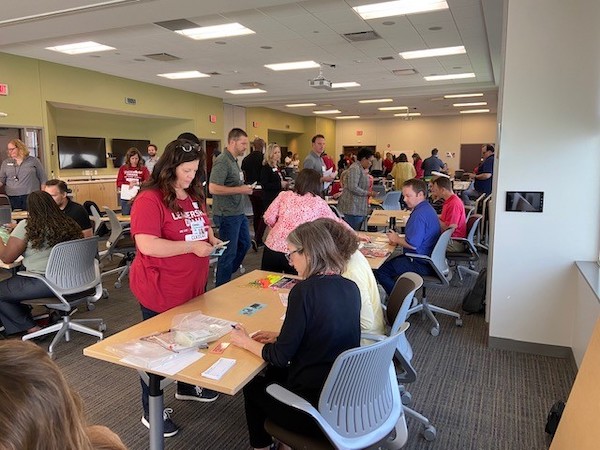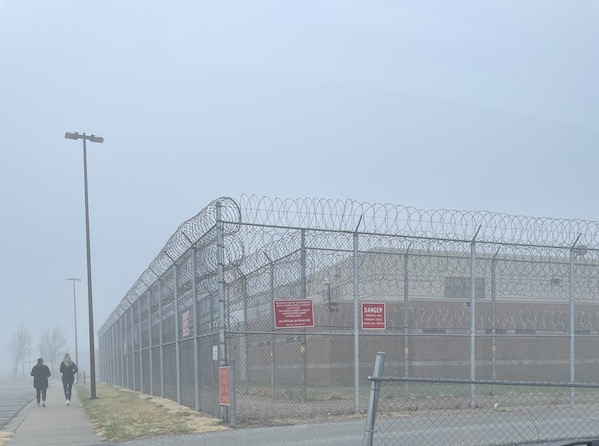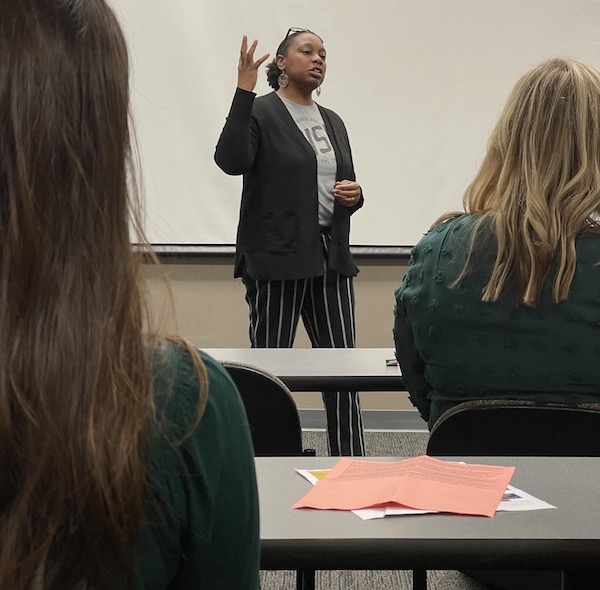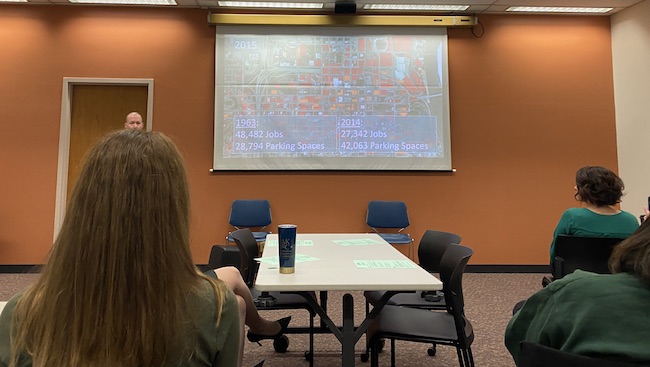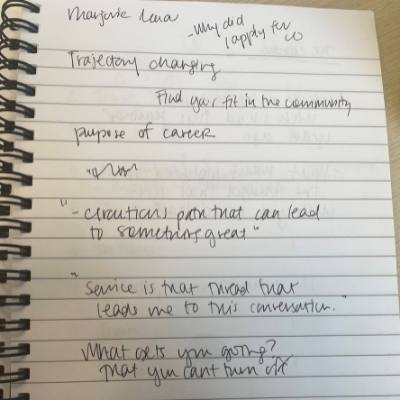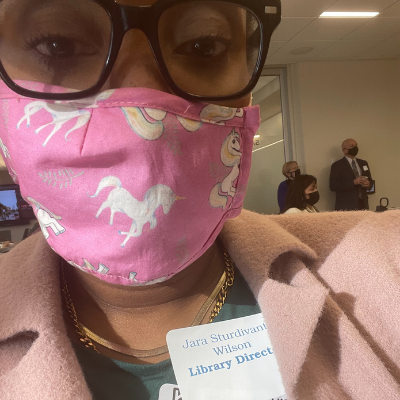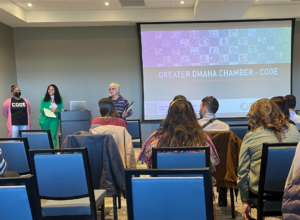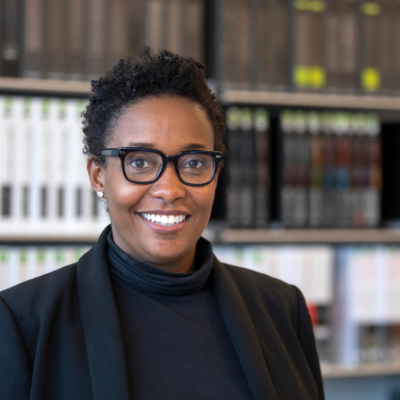Leadership Omaha is one of the longest running professional development programs at the Greater Omaha Chamber. Since 1978, participants have immersed themselves in a 10-month learning experience focused on molding them into more effective community leaders.
This year, we’re getting a look inside. We’ll follow Jara Sturdivant-Wilson, Global Corporate Communications Director, Associate Vice President at HDR, as she takes this 10-month journey.
Within a span of 10 days, we have seen tragedies in Buffalo and in southern Texas that have rocked our nation and have deeply impacted our own circle of family and friends. This collective grief, on top of the ongoing effects of the pandemic and inflation, have been a tragic and timely backdrop to this blog.
Our day began at Project Harmony, a local nonprofit aimed at counteracting and preventing child abuse. Each of us went through a poverty simulation, immersing ourselves into real-world roles as a family with or without government assistance, with or without interactions with law enforcement, with or without two adult caregivers and more. Poverty in this instance assumes that a person may have limited access to transportation, housing, food and education. Knowing that some classmates have first-hand experience of poverty or are in poverty now, this exercise had an element of privilege attached to it: Some of us could imitate hardship and then step back into our comfortable lives once the exercise ended.
I left the simulation even more frustrated with our system. My role was an unemployed parent with a family member with a disability, a working partner, a child in school and one vehicle. We had a mortgage, approached an eviction, pawned appliances – all while I attempted to receive additional government assistance. I visited one government agency three different days, only to be told we didn’t qualify for assistance, while unable to secure a job. Those feelings of frustration were amplified throughout the day, along with layers of accountability and responsibility for myself, my classmates and our community. Everything we reflected upon and discussed showed how each observation compounded over and over – into a spiral.
That morning we also heard from staff with the Nebraska Department of Health and Human Services, Omaha Police Department and others focusing on children’s services and early intervention.
As in other seminars, a common theme emerged: one scenario, one decision can have legacy-forming impacts.
Into the afternoon.
We are at the Food Bank for the Heartland and heard about affordable housing with Front Porch Investments, Nebraska Appleseed, Canopy South and Together. The day ended with a discussion on food insecurity with the food bank’s president and chief executive officer.
My classmates and I are now a week from graduation. In front of us is a predictable and probing question: Where do we go from here? Bearing witness to the reality of our neighbors’ world and their communities isn’t something that stops at commencement – it can’t.
And I think that’s the takeaway for Leadership Omaha and other local leaders – at least it is for me. Our decisions – or lack of – have legacy-forming impacts. That responsibility is immense. We must open our eyes, our ears, our minds and ultimately our hearts and hands to those in our communities.
When we truly become “others-focused,” the courage to do something worth lasting is right around the corner.
No smartphones. No watches. No electronic devices of any kind.
That was the order to our Leadership Omaha group as we filed through a metal detector and were individually searched at the Nebraska Correctional Youth Facility.
I realized I was walking into something very personal. And emotional. I have family and friends who have experienced negative encounters with law enforcement, and here we were – in the interior of “the system.” This minimum-to-maximum custody facility houses male juvenile offenders from adolescence to age 21. Capacity at the building in northeast Omaha is nearly 70 residents.
Staff began ushering us toward classrooms, where we could see instructors teaching basic educational objectives. Class is mandatory for those who don’t have a high school diploma or their GED and who are under 18. My only wish at that point was that they had a chance to learn what they wanted, what they found interesting. Teens need variety and options to keep their interest and their enthusiasm for learning alive.
We then met with four incarcerated youth, all individuals of color. Their crimes landed them sentences anywhere from five to 30 years. As they shared their stories and feelings, my mind raced to the sobering truth: How quickly one bad decision can affect the course of your entire life.
I kept thinking about the previous Leadership Omaha experience, where we learned how trauma has an impact on learning. Teachers and other educators can guide young people to avoid incarceration. But many kids start with some pretty big disadvantages. Several north Omaha neighborhoods generate some of the highest incarceration rates in the United States, according to a local media outlet’s analysis of Harvard University data. That’s heart-breaking. Two of those we visited with had lost their fathers and had no male role models. What if they had a teacher who was really invested in them? One young man shared that he was from a rural area. “None of this should have happened,” he said. “I should have listened to my parents.” It made me have a real appreciation for my mother and father, who are still very much a part of my life.
As a person of color, knowing the stats are stacked against me and others is unsettling. One of our Leadership Omaha classmates told me of his feelings afterwards: “We are centuries away from solving the problems within our justice system. Many Band-Aids over large wounds.”
Walking out, I picked up my phone, the dozens of emails I had missed and my normal life on the outside. But part of me remained on the inside, back with the young people who, while they had hurt others, were also hurting. I had a renewed sense of making things better for other young people who I’m going to meet. I want to make sure Omaha is a city that is good for youth. And my task now is to make sure it’s not just a feeling. I want to carry and see it through. Whether the system changes or not.
As luck would have it, I’m in our downtown library on St. Patrick’s Day. Our Leadership Omaha class is here to learn about economic development from members of the Greater Omaha Chamber.
Sitting in my professional green attire, I am immediately taken back to my childhood in elementary school in Franklin, Tennessee, where I volunteered at our local library. As a small girl with wide eyes toward all things reading, my job was to put checked-in books back in order on the right shelves. It was one of my favorite “jobs” of all time.
My fascination with literature never stopped, and today it led me to get my Omaha Public Library card – a physical, hold-in-your-hand honest-to-goodness library card. (Later in the week, after our Leadership Omaha event, I took my four-year-old daughter to get her card, as well.)
Digital subscriptions, digital media, digital technology. It’s all great, but I still like the feel of a book, with its cover and binding and (sometimes) even the smell of good ink. But, I digress.
In listening to this morning’s speakers, several things stood out:
- Development must be geographically inclusive; it’s not just about what we can do in north Omaha or in any other one location.
- As we adjust to what pandemic-normal looks like, businesses will still need office space, but they must think deeply about how to use it differently. The days of 100% occupancy might be over, but new creative working arrangements are just beginning.
- “The library is a social safety net.” The disadvantaged in our communities need a library and their outreach programs to feel welcomed and appreciated.
After the library – and after I got my card – the last half of the day was spent at Carson Wealth, a financial advisory firm. There, we heard from three businesspeople of color. More insights:
- “Omaha is a one phone-call city.” The things we need should be only one phone call away, but what happens if you don’t have the phone number? That’s where relationships come in. Connectivity is the key in business, in communication, in all things.
- Eight out of 10 Black-owned businesses fail in their first 18 months.
- Despite the disadvantages of these three individuals, their success largely has been due to their “stubbornness and unwillingness to quit.”
To sum up the day, my take-aways were that you should always have at least one green outfit in case you have to go out on St. Patrick’s Day. And at least three things are very important: connection, networking and access. And finally, library cards are still in vogue, and they will be as long as my daughter and I keep checking out our favorite books.
February
The Sum Total – Negative or Positive
“You are the sum total of everything you’ve ever seen, heard, eaten, smelled, been told, forgot – it’s all there. Everything influences each of us, and because of that I try to make sure that my experiences are positive.”
Maya Angelou penned those words, and I was recently reminded of how true they are when attending the latest Leadership Omaha event.
Our class met on a recent Thursday, first at NorthStar Foundation and then at Metro Community College. We were introduced to the concept of Adverse Childhood Experiences, or ACE. Each of us, we learned, come into adulthood with varying degrees of negative events from our “growing-up” years. In discussing the process of working through those pain points, the terms trauma sensitive and trauma informed were also mentioned. With the former, we acknowledge adverse events and adjust to them. With the latter, we may need medical intervention or customized therapy to overcome trauma.
I learned that 46% of students come to school with at least one ACE. Some come with three or four significant adverse experiences – which can include physical, verbal or sexual abuse and physical or emotional neglect. Other ACEs can be having an alcoholic parent, a family member in jail, divorced parents or a relative with a diagnosed mental illness. Throw in racism, bullying or even surviving a severe accident and you can see how ACEs can stack up.
The original ACE study performed by the Centers for Disease Control and Prevention found that two thirds of participants had at least one ACE and 87% of those had more than one.
Then we learned about PCEs, or positive childhood experiences.
It sounds simple but adding PCEs is important. The additional presentations from local public school officials reiterated how much our role models in Omaha can make either a negative or positive difference – the responsibility is huge. And living in this pandemic as a parent of a pre-schooler, my interest in how our local schools are responding to the next generation only increased.
One of my takeaways that day was the importance of staff self-care. One of our presenters quoted local community leader and philanthropist, the late Dick Holland, who said, “You are an asset too precious to waste.” That message goes out to those of us who lead – whether you’re a teacher, a parent, an elected official or a supervisor. In my own role as a communications director, I am responsible for a team of about a dozen individuals – they are too precious to waste. They work hard at sharing important information to those inside and outside of our company, day in and day out. It made me think even more about my role in providing a positive environment in which they can thrive, do their best work, and have space to think and rest and recover from the daily grind. This world of COVID has crept into home life and work life and the stress is real.
We are the sum total of everything we experience. I’m grateful for Leadership Omaha for giving me an opportunity to see that once again. It’s time to gather some more positive experiences.
Why did you apply for Leadership Omaha? Marjorie Maas, executive director with SHARE Omaha, challenged my fellow LO classmates with that question as she began her presentation during our January LO meeting.
Why did I apply for Leadership Omaha?
Through my involvement in Leadership Omaha, I want to identify ways to amplify the voices of those that are often marginalized. I also want to find authentic ways for true engagement in the community. By the end of my involvement in Leadership Omaha, I want to understand and support the direction that Omaha is going in education, economy, healthcare, advocacy and policy, diversity and inclusion, transportation and young professionals and where I can provide the best value.
With access to other leaders at various points in their careers and in different industries, I will refine my leadership style while collaborating with other leaders in Omaha. Learning from others and how their experiences inform their viewpoints and how they reflect their constituents’ concerns will continue to guide me in my leadership. Exposure to other backgrounds and beliefs push me to understand my unconscious biases and privilege and provide me opportunities to learn.
– From my application May 2021
Marjorie walked us through her LO experience and career in Omaha and articulated how her career and LO experience were on a “circuitous path that can lead to something great.” I saw, virtually, my other classmates and how they, too, were on this circuitous path to something great as well.
You heard it first right here: I am not running for mayor any time soon.
Leadership Omaha has given me a greater appreciation for how daunting public responsibility can be. In our most recent seminar, my class group started the day in a beautiful setting at Baird Holm that overlooked downtown – pretty fitting background to our day. Our first task was to get a proposed budget passed before a mock city council. We each had to take certain roles and present our case.
I played the library director, which was a good role for me – I have a minor in history and love, love, love reading. Easy, right?
I, along with other mock city department directors, only have one piece of the budget pie and needed to champion for our projects and priorities along with each other. In my role, I had to understand and accept that other departments are needed to have a healthy society. I tried to frame my argument on how the budget for the library would help the entire community.
Ultimately, our team budget was the one the “council” passed. My day was going great!
Then, we walked out the door and crossed the street to the real city hall. There, we heard a lecture on how state budgets get passed. Truth be told, there’s only so much information one can properly digest about unicameral before the head nod comes. Especially after lunch, in a comfortable place. I admit I wanted to be back in a library, or napping.
Quick snap out of that and we began the third, and last phase, of our Government Day: It was time to meet actual people who held the offices we had in our morning pretend time.
I heard different directors share their history in their role and their thoughts for the future. I heard phrases like “Your country is strong when your small businesses are strong.” Very fitting for this time of year.
Ultimately, I left this seminar with five things I will carry into my current job as a communications director:
- Decisions are made at the local level, so if you want something changed, don’t always assume you need to start at the top. Grassroots is still a solid strategy.
- Do your homework on those with whom you are about to interact. The research will pay off because it gives you more credibility with your audience. Before we met with council members, we had a rundown of their priorities, how long they were in office, etc. Next time, I would read more.
- The opposite of holding influence is harboring individualism. Get your draft ideas in front of people so they can provide input and steer you away from your blind spots.
- People are really passionate about Omaha. I hope, ultimately, that enthusiasm is reflected in the decisions they will be making in 2022. So, yes, be passionate about elements in your work.
- A lot of people are trying to do good things for Omaha. Be one of them.
The ups and downs and ins and outs of the latest Leadership Omaha session took me on quite the emotional rollercoaster.
The session focused on inclusivity and began with Katherine MacHolmes with K+R Strategies and a deep dive into the importance of land acknowledgements, microaggressions and the Crown Act. Our class jumped into some difficult and engaging discussions.
The first part of the seminar took place at QLI, a world-class rehabilitation center. I sat, uncomfortable, trying to reconcile discussions around microaggressions and inclusivity while also near this pocket of optimism at QLI. We heard from community members who shared their experiences at the center – a place that facilitates optimism in what could be devastating, life-altering situations. Here, people rebuild their lives after catastrophic injuries – strokes, chronic pain, loss of limbs. So many questions.
My head was still spinning during the second part of the day, where we learned about the refugee community at Tri Faith Initiative – and what we, as individuals and as a class, could do to support our nonprofits in this space. Tri Faith is one-of-a-kind, a single campus that is home to a synagogue, church, mosque and interfaith center.
In just one day, we delved into society’s subtle biases and outward discrimination against something as simple as people’s hair. We saw those hurt leaning into healing and the marginalized starting their lives over in a new country.
More questions.
I asked some of my classmates: Who has answers to these issues? How can we help? Who will teach us? Who will listen? Where do we start?
Someone must know. Surprise, no one does.
All we can do is continue to expand our hearts and minds and be willing to explore more. Our class is going to need it, too, because next up our seminar will focus on the government.
No one has emotions about politics, right?
October
City Environment

“Oh, this is what Leadership Omaha is about.” That was my first thought during the beginning of October’s Leadership Omaha seminar focused on the City Environment.
“I am exhausted.” That’s what I said nine hours later during the debriefing portion of the day.
One week later, when I was stuck in stand-still traffic on 16th Street on Wednesday, October 27—caught in a perfect storm of downtown construction, pouring rain and Hamilton at the Orpheum — I thought to myself, “Oh, this is what Leadership Omaha is all about.” I was heading to my small group’s meeting at Cumbia, and I was already late.
As I circled for 30 minutes, I remembered a week earlier at the Leadership Omaha seminar where we discussed Omaha’s development and philanthropic history while at The Venue at the Highlander near Seventy Five North’s campus. We discussed the abundance of parking in the downtown area and the new ORBT bus system. The parking commentary really stuck out to me at this point.
I thought to myself, “I need to ride the bus again.” I also thought, “we really do have a lot of parking downtown.” Then, also, “what can I do to support continued growth in the urban core.”
I was then struck by the memory of how we ended our day at Do Space, discussing the other part of Omaha’s history – redlining and the impacts to our community today. Although the topic and impacts of redlining are not new to me and my community, these topics were heavy and impacted my classmates in different ways. We left with different action items and I believe one common commitment – we know we must, and Omaha must, acknowledge we have significant work to do to undo some of the history we inherited and/or have had a part in perpetuating when it comes to community development and supporting our growth.
As I drove around downtown in the rain all of those memories from that first seminar came right back. I went into a dark parking garage, only to leave and circle some more while seeing buses drive by. Ultimately, ironically, I never did make it into Cumbia because of parking. I thought, “the lessons from that first seminar, those are what I need to ponder just a bit more.”
I drove past my small group a few times, only to find myself wondering, “what can our small group and others do to continue developing this place we call home.”
September
Opening Retreat
Leadership Omaha is a boot camp intensive about all things Omaha–past, present and future. It’s a group of strangers, acquaintances or those you know via six degrees of separation. At least, that’s how I initially described it. But, after our first retreat, I know that Leadership Omaha, is much more than that.
I’m a member of LO Class 44, the first class back after virtual LO Class 43. The class is filled with people from around the Omaha area who, like me, are wrestling with what Omaha looks like or should look like following the impacts of 2020.
We entered our first retreat not sure what our class would look like, what we would solve or question, and we left with our small groups, laughter and resolve to bear witness to what we will experience next.
Jara Sturdivant-Wilson
Jara Sturdivant-Wilson serves as HDR’s global corporate communications director and provides strategic leadership, direction and oversight to HDR’s global communications, both internally and externally. Married to Kenley Sturdivant-Wilson and mother to a four-year old Rainbow, Jara loves working out, riding her Peloton (#jaralikeSARAH), taking naps and reading 10 (at least) pages a day (#75hard). She sits on the boards of The Big Garden and Opera Omaha and is happy to support the growing Omaha community.
Be the leader you know you can be.
Leadership Omaha gives community leaders a chance to shine. If you have a vision for the future of Greater Omaha, then this is the program for you.
